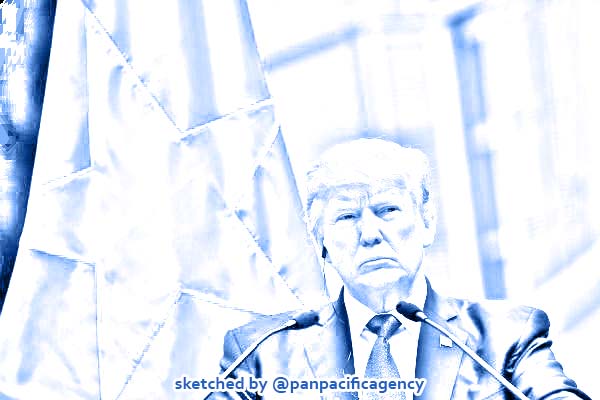[Analytics] Vietnam’s vulnerability to the US–China trade war

Donald Trump and Vietnam's flag. Sketched by the Pan Pacific Agency.
There are growing fears that the US–China trade war will spread to Vietnam. A logical way to approach the issue would be to start by examining the logic behind the US–China trade war and then assessing whether the same logic could lead to a US–Vietnam trade war. The problem with this approach is that the US–China trade war defies economic logic. James Riedel, Johns Hopkins, Markus Taussig, Rutgers University, specially for the East Asia Forum.
US President Donald J Trump speaks during a press conference at the Presidential Palace in Hanoi, Vietnam, 12 November 2017 (Photo: Reuters/Luong Thai Linh).
Economic theory and empirical evidence demonstrate that free international trade is generally a positive-sum game where overall both sides gain from trade. They also show that trade wars are generally a negative-sum game, meaning that overall both sides lose. There will inevitably be some who gain and some who lose within each country engaged either in free trade or a trade war, but from a national perspective, free trade is beneficial and trade wars are harmful.
Good economic policy happens when policymakers do their best to weigh the inevitable trade-offs that result from their policies. When a policymaker such as US President Donald Trump refuses to recognise that there are divergent interests within their country and ignores the inevitable trade-offs that result from their policy choices, the ongoing trade war with China is unsurprising.
The ‘Trumpian’ trade war logic is based on a string of false premises. Trump maintains that a trade deficit is a transfer of wealth to foreigners (the trade deficit being a measure of the amount by which foreigners are ‘ripping us off’). He steadfastly refuses to acknowledge that the surplus that China earns when it sells more to the United States than it buys flows right back to the United States by way of Chinese purchases of US government and private assets.
Trump insists that trade deficits cause a loss of jobs, ignoring the fact that larger trade deficits have historically been associated with higher levels of employment and lower levels of unemployment.
Trump also argues that China is manipulating the exchange rate when the Chinese renminbi depreciates in value, ignoring the possibility that the market — not the government — is behind movements in the exchange rate.
A government can, of course, purposely depreciate its currency to gain competitive advantage by having its central bank go into the market to buy foreign exchange. But this increases the domestic money supply and generally leads to domestic inflation, offsetting the competitive advantage of a depreciation.
Sustained currency manipulation requires the central bank to undertake sterilised intervention, an operation in which the central bank matches its purchases of foreign exchange with sales of domestic assets to the banking system to avoid the inflationary effect of devaluation. China practiced sterilised intervention for most of the 2000s but not thereafter.
China engaged in this form of protectionism in the 2000s to absorb hundreds of millions of rural labourers who were unemployed into export-oriented manufacturing after the Mao-era economic debacle. China benefitted from exchange rate protectionism and so too did the United States, but not all individuals gained. Some Americans lost jobs to Chinese import competition, while others — especially public and private borrowers in the United States — benefitted from China’s policy.
Can the same rationale be applied to Vietnam to spark another trade war? Vietnam’s trade surplus with the United States in 2017 was the 16th largest of all US bilateral deficits. Vietnam’s trade imbalance — exports minus imports — relative to total bilateral trade between the two countries in 2017 was larger than the relative trade imbalance of any other country, including China.
Yet, the United States should not initiate a trade war with Vietnam for the same reasons that suggest it should not be in a trade war with China. The United States has some legitimate complaints against China’s trade practices, mainly involving the theft of intellectual property and government subsidies that unfairly advantage state-owned enterprises in China. But the United States should be attacking those policies instead of restricting bilateral trade; the best policy is one that goes to the heart of a problem, thereby minimising unintended negative consequences.
Unlike China, Vietnam does not pose a geopolitical threat to the United States, providing yet another reason why the United States should not allow the trade war to spread to Vietnam. There are no grand strategy issues to be dealt with by leveraging trade policy, so economic outcomes should be the primary determinant for imposing tariffs. If anything, the United States should protect and promote trade with Vietnam as a modest counterbalance to China’s geopolitical aims as Vietnam is a useful pro-US voice in ASEAN.
There is no logical reason for the United States to expand the trade war to Vietnam, but logic does not seem to count for much in the case of the US–China trade war. Perhaps the best thing Vietnam can do is keep its head down and hope that Trump will be too distracted by China to notice Vietnam.
James Riedel is Emeritus Professor of International Economics at Johns Hopkins University.
Markus Taussig is Associate Professor of International Business at Rutgers University.